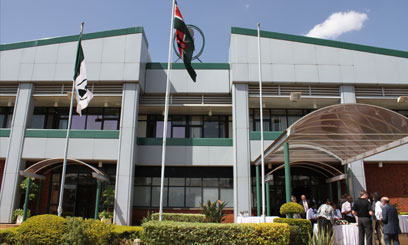
If approved, the deal will see the government take up a 40 percent stake in a new company to be known as De La Rue EPZ Kenya Limited/FILE
NAIROBI, Kenya, Apr 4 – British firm De La Rue has defended the proposal to enter into a joint venture with the government to set up a currency printing firm saying the move would be a good investment for Kenya.
Mark Crickett the Commercial Lead for the Kenya Joint Venture said on Wednesday that contrary to speculation that they were out to fleece Kenyans, the deal portends many benefits for the economy.
If approved, the deal will see the government take up a 40 percent stake in a new company to be known as De La Rue EPZ Kenya Limited.
“A joint venture with De La Rue does obviously maintains a critical piece of national infrastructure in Kenya and the security of local currency manufacture and there is some strategic benefit for the country in having this facility on shore,” he pointed out.
If the two parties sign the agreement, the new company will be formed by hiving down operating assets valued at Sh3 billion belonging to Thomas De la Rue Currency and Security Print Kenya that has been operating in the country since 1994.
The logic behind the move was that for Sh650 million (£5 million), the government would be inheriting a ‘clean’ company without incurring any financial liabilities.
Crickett further projected that the return on investment would be positive with the government being able to recoup its money after three years.
According to their projections, Earnings Before Interest and Taxes for De La Rue would be £4.7 million in the year 2012/2013, £5 million (2013/2014) and £5.3 million (2014/2015) out of which Kenya’s return on investment would be 37.6 percent, 77.6 percent and 120 percent respectively within the same period.
“Against the £5 million investment, the government would effectively repay its initial investment within a three year period of investing in the company,” Crickett emphasised.
De La Rue has been in the news in the recent weeks after the Public Accounts Committee (PAC) questioned whether the taxpayer would get value for money if the deal was concluded.
The negotiations which have dragged on for about five years were started after the government cancelled an agreement entered into between the minting firm and the Central Bank of Kenya (CBK) in 2007 to print new generation currencies.
The revocation of that contract, which would have seen the country pay less for its notes has kicked off a storm with Members of Parliament reading corrupt intent by politically connected individuals.
Had the 2006 contract been allowed to run, it would have cost £20.84 to print 1,000 pieces of Sh50 notes; £21.03 to print a similar quantity of the Sh100 notes and £14.15, £12.47, £12.45 to print the Sh200, Sh500 and Sh1, 000 notes respectively.
Upon its termination however, the CBK has had to place short term orders at a cost of £28 per 1,000 pieces to meet the demand for currency notes in the country.
A source however explained to Capital Business that the prices in the cancelled contract were cheaper because the paper that the notes would have been printed on would have been of lower quality while the notes would be smaller in size.
In addition, De La Rue intended to print the 1.7 billion pieces of currency in one of the subsidiaries abroad – Malta- where the cost of production is lower.
While PAC argued that the interim orders could have cost the taxpayer about Sh2.7 billion in the six years that the contract was cancelled, the project leader was quick to point out that the net gain to the economy for producing the notes locally was higher.
“We’ve probably injected over Sh6 billion into the local economy within that period (2003 to 2009), which I would argue compares favourably to Sh2.7 billion, which has been suggested as being the incremental cost of having the notes produced here in Kenya,” he held.
Despite the concerns, Crickett said they remain optimistic that a deal will be reached soon.
“We would like to complete the process and then move forward in developing and expanding the business here in Kenya,” he said of their expectations. The minting firm has a business plan that it hopes to execute and one that includes investing in newer technology.
If a deal does not materialise however, the company has indicated that it would be forced to fold as there would be no guaranteed business to sustain their operations.
Currency printing at the Ruaraka factory accounts for over 90 percent of the operations with Kenya taking up about 60 percent of that. The plant is also used to print other countries’ currencies and other security documents including passports, driving licences, authentication labels and tax stamps.
Should it close down, Crickett noted that this would be a loss to Kenya which is just one of the four countries in sub-Saharan Africa which produces its notes within its territory.
Besides losing its standing as De La Rue’s Africa hub, the closure of their operations would also bring with it the loss of some 260 jobs and an annual revenue loss of Sh1 billion to the economy.



































